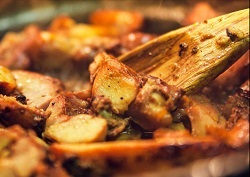
The University of Reading has become the first university in Europe to become a member of a network making meals served on campuses around the world healthier and more environmentally friendly.
The University has been admitted to the Menus of Change Universities Research Collaborative (MCURC). This means it will take an active role along with international researchers and food service leaders to seek new and innovative ways to encourage people to choose healthier, more sustainable options, such as replacing red meat with more environmentally friendly protein sources or using reusable drink cups.
The news comes as the University was also named winner of the Innovation in Catering category of the CUBO Awards 2020, which rewards and showcases the very best in higher education commercial services.
Matt Tebbit, Head of Residential Catering and Bars, said: “Joining the Menus of Change University Research Collaborative strengthens our commitment to providing sustainable food and drink on our campuses. Focusing on quality not quantity, creating delicious, plant-forward meals, and harnessing renewable energy are all ways we can drive down the University’s carbon footprint as well as make our students and staff healthier.
“This all builds on the award-winning sustainability work we have already been doing on campus, which uses the expert knowledge of our own researchers to improve our menus, and has turned our dining rooms into live laboratories where we can study eating behaviours, teach sustainable practices, and come up with brand-new ideas.”
The Menus of Change movement is led by The Culinary Institute of America and Harvard T.H. Chan School of Public Health, advanced through its 24 Principles of Healthy, Sustainable Menus. Brought together by their shared commitment to those principles, the MCURC is a collaboration of forward-thinking scholars, foodservice leaders, executive chefs, and administrators for colleges and universities who are accelerating efforts to move people toward healthier and more sustainable foods using evidence-based research, education, and innovation.
Reading has been following the movement for around two years and is now one of 59 university and colleges in the world to be members of the Collaborative, with Google and the US Olympic Training Center also among its collaborating organisations, totaling 250 individual members.
The University offers numerous sustainable options in more than 20 eateries across campus. Joining the MCURC reaffirms its pledges to reduce waste, provide more plant-forward – meals that are not necessarily meat-free but focus on plant-based foods – and healthier options, and operate in a way that keeps its carbon footprint as low as possible.
As part of its Menus of Change commitments, Reading is participating in the ‘Protein Flip’ culinary strategy, which encourages the serving of dishes highlighting plant-based foods, such as legumes, nuts, seeds and whole grains, while reducing the emphasis on meat (especially red meat) and dairy products. Doing so has benefits for health as well as the environment.
Reading will also contribute to the Collaborative’s academic and operational research efforts, developing and testing new recipes, participating in multi-site behavioural research studies, and implementing effective strategies to make catering more sustainable.
Innovative catering initiatives at the University under its own Sustainable Food Policy include:
- increasing recycling and reusable cups and containers, including through the Sustain It drinks machines
- banning plastic straws in campus outlets and replacing them with ones made from natural straw
- working towards displaying carbon footprint information on menus
- using renewable energy for cooking and heating in a number of outlets
- sourcing more food and drink, such as beef and lamb, from the University’s own farms
- supporting farmers, processors and animal welfare
- using local and ethical suppliers
- removing highly processed food from menus
Reading’s CUBO Award recognised the introduction of smart self-service coffee machines in campus eateries. These use specially-designed reusable cups with in-built microchips and offer hot drinks to subscribers at a significantly lower price, which has boosted the use of reusable cups at the University from 12% to 69%.
The University has made significant progress in recent years in reducing its institutional carbon footprint and that of the wider area.
